Phosphatidylserine and Stress Reduction for People with BDD
Introduction
Living with Body Dysmorphic Disorder (BDD) often means living in a state of constant internal tension. Every mirror reflection, social situation, or stray thought about appearance can trigger a surge of anxiety, self-criticism, and emotional fatigue. Over time, this chronic stress doesn’t just affect mood—it affects your brain chemistry, hormone balance, and overall resilience.
For many people with BDD, managing stress becomes a daily struggle. The body stays stuck in “fight-or-flight” mode, and the nervous system rarely has a chance to rest. This continuous activation drains energy, disturbs sleep, and heightens intrusive thoughts about appearance.
But what if you could calm your body’s stress response at the biochemical level? That’s where Phosphatidylserine (PS)—a naturally occurring phospholipid found in the brain—comes in. PS helps regulate cortisol (the main stress hormone), supports healthy brain function, and promotes a calmer, more focused state of mind.
In this article, we’ll explore how phosphatidylserine works, why it’s important for people with BDD, and how it can help rebuild the mental and emotional balance needed for recovery.
Looking for supplements for This? Click here.
Understanding Stress in Body Dysmorphic Disorder ⚡

Before diving into the science of phosphatidylserine, it’s important to understand how chronic stress manifests in BDD.
BDD isn’t just about dissatisfaction with appearance—it’s about hyperactivation of the stress system in response to perceived flaws or social situations.
Each time you worry about how you look, check the mirror, or imagine how others might perceive you, your body reacts as if you’re in danger. The hypothalamic-pituitary-adrenal (HPA) axis—the system that regulates stress—releases cortisol and adrenaline to prepare you for threat.
But because BDD triggers are often constant, this response doesn’t shut off. The result is a state of chronic physiological arousal, characterized by:
Rapid or shallow breathing
Racing heart and tension in the chest
Digestive issues from cortisol imbalance
Fatigue and brain fog
Trouble sleeping
Emotional volatility or burnout
This perpetual stress loop reinforces BDD symptoms. When the body is stuck in high alert, the mind becomes hyper-focused on threat cues—like perceived imperfections—and struggles to disengage.
Phosphatidylserine works directly within this system to reduce cortisol, improve neural communication, and help the brain return to equilibrium.
What Is Phosphatidylserine? 🧬
Phosphatidylserine (PS) is a phospholipid, a type of fat molecule that forms the outer layer of all brain cells. It’s essential for keeping neurons flexible and functional, allowing them to send and receive signals efficiently.
PS plays a crucial role in:
Maintaining cell membrane integrity
Facilitating neurotransmitter release (especially acetylcholine and dopamine)
Supporting memory and learning
Regulating the HPA axis and cortisol output
While the body can make small amounts of PS, most of it comes from food—particularly fish, soy, and eggs. Modern diets often fall short, leading to reduced phospholipid levels in the brain over time.
How Phosphatidylserine Regulates Stress 🧘
The most well-known benefit of PS is its ability to balance cortisol—the hormone that drives much of the physical and emotional discomfort associated with stress.
When cortisol levels are chronically high, you may feel anxious, wired, and restless. When they drop too low (due to burnout), you might feel fatigued and emotionally numb. PS helps bring this system back into balance.
Normalizing Cortisol Levels
Clinical studies show that PS supplementation reduces excessive cortisol production during and after stressful situations. For instance, in one study, participants taking 400 mg of PS daily showed significantly lower cortisol levels and improved mood after mental stress tasks compared to placebo.
For people with BDD, this means the physiological intensity of anxiety may decrease—making intrusive thoughts less overwhelming and easier to manage.
Supporting the Parasympathetic Nervous System
PS helps shift the body out of “fight-or-flight” and into “rest-and-digest” mode by improving vagal tone (the parasympathetic nerve system’s calming influence). This allows your heart rate, breathing, and digestion to normalize after stressful triggers.
Protecting Brain Cells Under Stress
Chronic stress damages brain cells by increasing oxidative stress and inflammation. PS acts as a neuroprotectant, stabilizing membranes and supporting repair mechanisms that maintain clarity and focus even under prolonged strain.
The Connection Between Cortisol and BDD 🧠💫
Cortisol is not inherently bad—it’s essential for energy and focus. The problem arises when it becomes chronically elevated.
In people with BDD, cortisol dysregulation leads to:
Heightened emotional reactivity (even small comments feel threatening)
Poor memory and concentration due to hippocampal stress
Increased body tension and fatigue
Sleep disturbances that amplify anxiety
Over time, high cortisol alters brain structure and function—particularly in areas involved in self-perception and emotional control, such as the prefrontal cortex and amygdala.
Phosphatidylserine helps reset this cycle by calming the body’s overactive stress circuits and allowing the brain to recover from prolonged tension.
Phosphatidylserine and the Brain: Cognitive and Emotional Benefits 🧩
Beyond reducing cortisol, PS enhances mental clarity, focus, and mood stability—areas that are often compromised in BDD.
Improved Memory and Learning
Chronic stress can impair the hippocampus, the brain’s memory center. PS supports hippocampal health and has been shown to improve memory recall and learning speed. This is particularly helpful in therapy, where integrating new coping strategies requires cognitive flexibility.
Better Focus and Cognitive Flexibility
People with BDD often describe “mental clutter”—constant intrusive thoughts that make it difficult to focus. By stabilizing neural communication, PS helps clear mental fog and improves the ability to switch attention between thoughts, reducing obsessive loops.
Mood and Motivation Support
Phosphatidylserine enhances dopamine receptor sensitivity, which can lift mood and motivation. This helps counteract the emotional numbness or hopelessness that often accompanies chronic stress and obsessive thinking.
Enhanced Sleep Quality
High cortisol at night is a major cause of insomnia and restless sleep. PS taken in the evening can help lower nighttime cortisol, promoting deeper, more restorative rest.
The Science: What Studies Show 🧪
Phosphatidylserine has been widely studied for its effects on stress and cognitive function.
Cortisol Reduction: In a landmark study by Monteleone et al. (1990), PS supplementation (400 mg/day) significantly lowered cortisol and ACTH levels in healthy volunteers exposed to stress tests. Participants reported feeling calmer and more centered.
Mood Improvement: Benton et al. (2001) found that PS improved mood and reduced perceived stress in individuals with high anxiety sensitivity.
Cognitive Enhancement: Studies in older adults and athletes show that PS improves memory, mental accuracy, and concentration—suggesting it enhances resilience under both physical and psychological stress.
These findings highlight PS as one of the few natural compounds that directly interacts with the stress response system to bring lasting calm and clarity.
Why People with BDD May Benefit from PS 🌿
BDD is both an emotional and neurological condition. While therapy addresses distorted self-image and behavioral patterns, biochemical support helps regulate the body’s stress foundation.
Phosphatidylserine benefits individuals with BDD in several key ways:
Reduces anxiety intensity: By normalizing cortisol, PS helps lower the physical sensations of panic and tension that accompany obsessive thoughts.
Supports clearer thinking: Improved neural communication helps you respond rationally instead of reactively when triggered.
Improves sleep and recovery: Lower nighttime cortisol leads to better rest, helping regulate mood and energy.
Enhances therapy outcomes: A calmer, more focused brain can integrate therapeutic insights more effectively.
Promotes long-term resilience: Over time, PS strengthens the brain’s adaptability and resistance to future stressors.
Phosphatidylserine and Emotional Regulation 🌙
Emotional dysregulation—feeling either too much or too little—is one of the hardest aspects of BDD. You might find yourself oscillating between intense shame, anger, and exhaustion, often triggered by seemingly small events.
Phosphatidylserine’s effect on cortisol smooths these emotional peaks and valleys. By reducing the physiological charge behind emotional reactions, it allows for more distance between feeling and reaction.
When your body is calm, your thoughts slow down, and your ability to observe your emotions increases. This makes practices like mindfulness, breathwork, or Cognitive Behavioral Therapy (CBT) far more effective.
Dosage and How to Take Phosphatidylserine 💊
Recommended dosage:
General stress reduction: 200–400 mg per day
Cognitive enhancement or high cortisol: Up to 600 mg daily (divided doses)
Best timing:
Take with meals, as PS is fat-soluble.
For stress or sleep issues, take the final dose 1–2 hours before bedtime.
Duration:
Consistent use for 4–8 weeks is typically needed for noticeable results, though some people report improvements in calmness and focus within days.
Stacking options:
With Omega-3s: Enhances absorption and synergistically supports cell membranes.
With Magnesium or L-Theanine: Deepens relaxation and supports neurotransmitter balance.
With B Vitamins: Assists in energy metabolism and neurotransmitter synthesis.
Safety and Side Effects ⚠️
Phosphatidylserine is considered very safe and well-tolerated. Most studies report no significant side effects, even at higher doses.
Mild side effects (rare):
Temporary stomach discomfort
Headache or vivid dreams (usually at high doses)
Cautions:
Consult your doctor if you take blood thinners, antidepressants, or other medications that affect mood or stress.
Pregnant or breastfeeding individuals should seek medical guidance before use.
Nutrition and Natural Sources of Phosphatidylserine 🍣🥚
You can obtain small amounts of PS from food, though supplementation is often required for therapeutic effects.
Food sources include:
Oily fish (salmon, mackerel, tuna)
Soy lecithin
Egg yolks
White beans
Organ meats (liver)
Modern diets tend to be lower in phospholipids due to food processing, which is why supplementation is often beneficial for supporting brain health and stress balance.
Integrating Phosphatidylserine into BDD Recovery 🌿💛
Phosphatidylserine can be an excellent addition to a holistic healing plan that includes therapy, mindfulness, and nutrition. Here’s how it fits into a daily framework:
Morning:
Gentle movement or stretching to regulate cortisol naturally
PS (200 mg) with breakfast to support focus and calm energy
Afternoon:
Mindfulness or therapy session (benefiting from improved mental clarity and stress resilience)
Evening:
PS (200 mg) with dinner or a light snack to promote lower cortisol and deeper sleep
Wind down with deep breathing or journaling to integrate emotional insights
Consistency is key—phosphatidylserine works best when combined with intentional daily practices that help your nervous system relearn calm.
Supporting Stress Reduction Through Lifestyle 🧘
While supplements like PS help regulate your biochemistry, lifestyle habits reinforce the same pathways:
Sleep: Prioritize at least 7–8 hours; poor sleep raises cortisol and worsens BDD symptoms.
Exercise: Moderate aerobic activity (like walking, swimming, or cycling) improves cortisol rhythm and dopamine balance.
Nutrition: Include healthy fats (avocado, olive oil, salmon) for phospholipid and hormone balance.
Mindfulness & Breathwork: Practice deep, slow breathing to activate the parasympathetic nervous system.
Want to try Breathwork? Click Here.
Therapy: Use CBT or mindfulness-based therapy to challenge distorted body image thoughts while PS supports focus and calm.
Looking for online therapy ? Click Here.
When combined, these practices create a self-reinforcing loop of healing—each supporting the other biologically and psychologically.
The Mind-Body Connection: Healing from the Inside Out 🧠💚
Phosphatidylserine represents more than a supplement—it’s a bridge between mind and body. It helps the body remember how to feel safe again, calming the biochemical chaos that keeps you trapped in obsessive patterns.
By stabilizing cortisol and supporting brain cell communication, PS helps create the physiological foundation for emotional resilience and clear self-perception.
When the body relaxes, the mind follows. When cortisol drops, therapy deepens. When neurons communicate smoothly, your thoughts become less tangled.
This is the essence of healing: rebuilding calm from the inside out.
Final Thoughts: A Calmer Brain for a Calmer Self 🌿✨
Living with Body Dysmorphic Disorder can feel like your mind and body are always working against you—but phosphatidylserine offers a way to bring them back into alignment.
By reducing cortisol, protecting brain cells, and enhancing emotional regulation, PS helps restore what chronic stress has taken away: mental clarity, energy, and peace.
Combined with therapy, mindfulness, and self-compassion, it can help you create a new relationship with stress—one that supports healing instead of resistance.
Because when your nervous system feels safe, your perception begins to soften—and you can finally start to see yourself through calmer eyes. 🌿💛
Looking for online therapy ? Click Here.
References 📚
Monteleone, P., Maj, M., Beinat, L., Natale, M., & Kemali, D. (1990). Blunting by chronic phosphatidylserine administration of the stress-induced activation of the hypothalamo-pituitary-adrenal axis in healthy men. European Journal of Clinical Pharmacology.
Benton, D., et al. (2001). The influence of phosphatidylserine supplementation on mood and heart rate during acute stress. Nutritional Neuroscience.
Jäger, R., et al. (2007). Phosphatidylserine and cognitive function. Nutrition Research.
Crook, T. H., et al. (1991). Effects of phosphatidylserine on memory and learning in age-associated memory impairment. Neurology.
Hellhammer, J., et al. (2004). Supplementation with phosphatidylserine reduces stress and improves mood in chronically stressed subjects. Journal of the International Society of Sports Nutrition.
Glade, M. J., & Smith, K. (2015). Phosphatidylserine and the human brain. Nutrition Reviews.
Baumeister, R. F., et al. (2017). The physiology of stress and its regulation through supplementation and lifestyle modification. Frontiers in Psychology.
Deijen, J. B., et al. (2002). Phosphatidylserine improves cognitive performance and attenuates stress response. Pharmacology Biochemistry and Behavior.
Wurtman, R. J., & Cansev, M. (2011). Nutritional support of brain phospholipids and neurotransmitter synthesis. Nature Reviews Neuroscience.
Vaisman, N., & Pelled, D. (2006). Phosphatidylserine: A natural nutrient for memory and mood. Clinical Nutrition.
Related Posts
-

Ashwagandha and Co-Dependency: Supporting Stress Resilience
Stress is more than a feeling—it’s a full-body signal that your system is overwhelmed. When the mind races and the body tenses, your hormones, breathing, and focus all shift into survival mode. Chronic stress doesn’t just affect emotions—it reshapes your nervous system, drains your energy, and clouds your clarity. Learning to understand and manage stress gently is the first step toward peace, balance, and true recovery. 🌿💫
-

Why Co-Dependency Feels Draining: Adrenal Fatigue and Supplements That Help
The adrenal glands are small but powerful organs that sit above your kidneys, acting as your body’s built-in stress managers. They produce hormones like cortisol and adrenaline that help regulate energy, mood, and resilience. When they’re overworked from chronic stress or emotional exhaustion, fatigue and imbalance follow. Supporting adrenal health naturally can help restore calm, energy, and hormonal balance. 🌿⚡
-

The Link Between Anxiety, Co-Dependency, and Natural Support
Anxiety feels like living in constant alert mode—your heart races, your thoughts loop, and your body can’t find peace. It’s the nervous system’s way of preparing for danger, even when none exists. Understanding what’s happening in your mind and body is the first step toward calming the storm and restoring balance. 🌿💫
-

Supplements That Support Dopamine and Serotonin in Co-Dependent Patterns
Serotonin is the neurotransmitter of calm, confidence, and contentment. When it’s balanced, you feel peaceful and emotionally grounded. When it’s low, anxiety, mood swings, and emotional dependence take over. By understanding serotonin’s role in emotional health—and how to support it naturally—you can rebuild inner stability, improve relationships, and cultivate lasting happiness from within. 🌞💫
-

How Emotional Exhaustion in Codependency Impacts the Nervous System
The nervous system is the body’s communication network, connecting the brain to every organ and muscle. It regulates stress, mood, and emotion through a delicate balance of electrical and chemical signals. When overwhelmed, it can become dysregulated—leading to fatigue, anxiety, and emotional imbalance. Understanding how to calm and strengthen the nervous system is key to healing from chronic stress and emotional burnout. ⚡🌿
-

What Is Co-Dependency? The Role of Brain Chemistry and Stress
Stress is more than a feeling—it’s a full-body experience that begins in the brain and ripples through every cell. When cortisol surges and the nervous system stays on alert, your body can’t rest or recover. Over time, this constant tension affects energy, focus, mood, and even immune health. Understanding stress chemistry is the first step toward breaking free from burnout and finding calm again. 🌿
-

Creating a Supplement Stack for Motivation, Energy, and Anti-Procrastination
Motivation is the fuel behind every meaningful achievement—but it’s not just about willpower. It’s a mix of mindset, brain chemistry, and momentum. When energy, focus, and purpose align, action feels natural instead of forced. Learn how to harness motivation as a daily state, not a fleeting feeling.
-

Supplements for Building Consistency and Reducing Chronic Procrastination
Biochemistry is the bridge between biology and chemistry—the science of life at the molecular level. It explains how nutrients, hormones, and neurotransmitters interact to create energy, thought, and emotion. From brain function to muscle movement, biochemistry reveals the invisible processes that sustain health, balance, and vitality.
-

GABA and Procrastination: Supporting Calm Focus for Productivity
GABA is the brain’s natural calming messenger—a neurotransmitter that helps slow mental overactivity and ease stress. When GABA levels drop, focus fades, anxiety rises, and procrastination becomes more likely. By supporting GABA through nutrition, lifestyle, and supplements, you can restore calm clarity, improve focus, and take action with steady, balanced energy.
-

Ashwagandha and Procrastination: Lowering Stress to Improve Action
Science is the language of curiosity and discovery. It helps us understand the hidden patterns behind life, energy, and the universe. Through experimentation and critical thinking, science connects imagination to evidence—turning questions into knowledge. Whether through microscopes, molecules, or minds at work, science represents our endless pursuit of truth and innovation.
-

Neurotransmitters and Motivation: Supplements That Support Drive and Focus
Supplements can do more than boost physical health—they can also enhance mental clarity, focus, and motivation. Nutrients like omega-3s, magnesium, B vitamins, and adaptogens help balance neurotransmitters, stabilize mood, and support brain energy. When combined with good sleep, nutrition, and mindful habits, they can transform how your brain performs under stress.
-

How Stress Hormones Like Cortisol Fuel Procrastination (and What Helps)
Blood sugar isn’t just about physical health—it directly impacts focus, mood, and motivation. When glucose levels spike and crash, energy and attention do the same, fueling procrastination and brain fog. Learning how to stabilize blood sugar through balanced meals, mindful habits, and key nutrients helps keep your mind steady, focused, and ready to act.
-

Brain Fog and Procrastination: Supplements for Mental Clarity
Brain fog can turn even simple tasks into mental hurdles. When your thoughts feel slow and unclear, procrastination often follows—making focus and productivity seem impossible. This article explores the biochemical and lifestyle causes of brain fog and reveals the most effective supplements for restoring mental clarity, focus, and sustained energy.
-

The Link Between Low Energy and Procrastination: Can Supplements Help?
Neurochemistry shapes how we think, feel, and act. When neurotransmitters like dopamine, serotonin, and GABA fall out of balance, it can lead to fatigue, anxiety, or lack of motivation—fueling procrastination and low mood. Understanding the brain’s chemical communication system helps us find ways to restore focus, calm, and emotional stability through nutrition, mindfulness, and targeted supplements.
-

Why Do We Procrastinate? The Role of Dopamine and Supplements That Support It
Dopamine is the brain’s motivation messenger—the chemical that fuels focus, reward, and drive. When dopamine levels drop, even simple tasks can feel impossible to start. This article explores how dopamine shapes procrastination, motivation, and mental energy, along with natural supplements and daily habits that help restore balance and get things done.
-

How Antioxidants Like Vitamin C & E Support Mental Health in BDD
Antioxidants are the body’s natural defense against stress and inflammation. For people with Body Dysmorphic Disorder (BDD), oxidative stress can worsen fatigue, anxiety, and emotional imbalance. Nutrients like Vitamin C and E help protect brain cells, boost neurotransmitter function, and support a calmer, clearer mindset—building a stronger foundation for recovery.
-

Ginkgo Biloba and Memory Support for BDD Recovery
Emotional regulation is the foundation of healing from Body Dysmorphic Disorder (BDD). When the nervous system stays in constant overdrive, even small stressors can trigger self-critical spirals. Learning to calm emotional reactivity helps restore clarity, confidence, and a sense of inner balance. By blending mindfulness, nervous system support, and self-compassion, you can retrain your brain to respond—not react—to emotion.
-

Alpha GPC and Cognitive Function in Body Dysmorphic Disorder
Mental fatigue can feel like your brain has hit a wall—thoughts slow down, focus fades, and motivation disappears. For people with Body Dysmorphic Disorder (BDD), chronic overthinking, emotional stress, and constant self-evaluation can deplete mental energy even further. Understanding what causes this cognitive exhaustion is the first step toward recovery—through rest, balanced nutrition, and targeted brain-supporting supplements.
-

N-Acetyl L-Tyrosine and BDD: Supporting Mental Clarity
Chronic stress doesn’t just affect your mood—it reshapes your brain chemistry, weakens focus, and fuels the obsessive thought loops common in Body Dysmorphic Disorder (BDD). Over time, constant cortisol elevation drains mental energy and emotional balance. Learning to recognize and manage chronic stress is essential to restoring mental clarity, self-compassion, and resilience.
-

Chamomile and Lavender for Calming Obsessive Body Image Thoughts
The nervous system is the command center of our emotional and physical world—and in Body Dysmorphic Disorder (BDD), it often operates in overdrive. Understanding how the brain and body communicate under stress reveals why intrusive thoughts feel uncontrollable. Learning to regulate the nervous system through calm practices, nutrition, and supplements helps restore inner balance and emotional safety.
-

Adaptogens for Body Dysmorphic Disorder: Rhodiola, Ginseng, and More
Rhodiola rosea, often called the “golden root,” is an adaptogenic herb renowned for boosting stress resilience and mental endurance. For individuals with Body Dysmorphic Disorder (BDD), Rhodiola may help reduce fatigue, regulate cortisol, and enhance emotional balance. By supporting both mind and body, this powerful plant promotes calm focus, improved mood, and renewed energy to face daily challenges.
-

B Vitamins for Stress Resilience in BDD: Rebuilding Calm from Within
Biochemistry is at the heart of every thought, emotion, and reaction we experience. In Body Dysmorphic Disorder (BDD), chemical imbalances in neurotransmitters like serotonin, dopamine, and GABA can amplify stress and distort self-perception. Understanding the biochemistry behind mood and stress regulation offers a path toward healing—bridging the gap between emotional experience and the body’s molecular balance.
-

Melatonin and Body Dysmorphic Disorder: Restoring Healthy Sleep Patterns
Melatonin, the body’s natural sleep hormone, plays a vital role in helping people with Body Dysmorphic Disorder (BDD) restore healthy sleep cycles. When anxiety and obsessive thinking interfere with rest, melatonin levels often drop, leading to more emotional reactivity and distorted self-perception. This article explores how melatonin works, why BDD disrupts it, and how natural supplementation—combined with mindful routines—can help the brain and body finally find calm at night.
-

Sleep Struggles with BDD: Supplements for Rest and Recovery
When you’re living with Body Dysmorphic Disorder (BDD), restful sleep can feel impossible—but the right supplements can help reset your body’s natural rhythm. From magnesium and L-theanine to 5-HTP and ashwagandha, these nutrients support relaxation, lower cortisol, and enhance melatonin production. This article explores how supplements can calm the mind, ease nighttime anxiety, and promote true restorative sleep for emotional and physical recovery.
-

5-HTP and Serotonin Balance: Could It Help with Body Dysmorphic Disorder?
Anxiety can feel like a storm inside the mind—restless, overwhelming, and hard to control. In people with Body Dysmorphic Disorder (BDD), anxiety often fuels obsessive thoughts and self-criticism, creating a painful cycle of worry and self-doubt. This article explores the biological roots of anxiety, the role of neurotransmitters like serotonin and GABA, and how natural strategies such as mindfulness, supplements, and nervous system regulation can restore calm and mental clarity.
-

Can Ashwagandha Help Ease Stress and Anxiety in Body Dysmorphic Disorder?
Neurotransmitters like serotonin, dopamine, GABA, and acetylcholine are the chemical messengers that shape how we think, feel, and react to stress. In Body Dysmorphic Disorder (BDD), imbalances in these neurotransmitters can amplify anxiety, obsessive thinking, and emotional distress. This article explores how restoring healthy brain chemistry through nutrition, supplements, and mindfulness can help bring clarity, calm, and emotional stability.
-

L-Theanine for BDD: Finding Calm in the Mind
Neurochemistry plays a central role in how we think, feel, and see ourselves. For those living with Body Dysmorphic Disorder (BDD), imbalances in neurotransmitters like serotonin, dopamine, and GABA can intensify anxiety, obsessive thoughts, and emotional distress. This article explores how regulating brain chemistry through supplements, mindfulness, and lifestyle changes can bring the nervous system back into harmony and restore inner calm.
-

Omega-3 Fatty Acids and Body Image Disorders: Supporting Emotional Health
Omega-3 fatty acids do far more than support heart health—they nourish the brain, stabilize mood, and may ease the emotional turbulence tied to body image disorders like BDD. This in-depth article explores how omega-3s regulate serotonin, dopamine, and inflammation, helping individuals reduce obsessive thoughts and rebuild self-acceptance. It also connects nutrition to therapy, mindfulness, and nervous system balance for holistic emotional healing.
-

Magnesium and BDD: Calming an Overactive Nervous System
Magnesium plays a crucial role in calming an overactive nervous system—something people with Body Dysmorphic Disorder (BDD) struggle with daily. This article explores how magnesium supports relaxation, emotional regulation, and stress reduction while diving into the science behind its connection to brain chemistry. It also examines how combining magnesium supplementation with therapy and breathwork can help rebalance the body’s stress response, reduce obsessive thought patterns, and promote lasting nervous system calm.
-

The Gut-Brain Axis and BDD: Why Probiotics Might Matter
The gut and brain are constantly in conversation — and that dialogue may shape how you experience Body Dysmorphic Disorder. By nurturing your microbiome with probiotics, prebiotics, and gut-healing nutrients, you can help rebalance serotonin, calm anxiety, and restore emotional stability from within 🧠🦠.
-
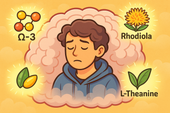
Brain Fog and Body Dysmorphic Disorder: Can Nootropic Supplements Help?
Brain fog often accompanies Body Dysmorphic Disorder, clouding focus and deepening emotional fatigue. Nootropic supplements like L-theanine, Rhodiola, and CoQ10 can help restore mental clarity, balance neurotransmitters, and bring calm energy back to the mind 🌿🧠.
-

How Stress Hormones Like Cortisol May Worsen Body Dysmorphic Disorder
Chronic stress floods the brain with cortisol — the hormone that keeps you on high alert. In Body Dysmorphic Disorder, this chemical overdrive fuels anxiety, distorts self-image, and traps the body in survival mode. Calming cortisol helps restore both peace and perspective 🌿🧠.
-

The Role of Neurotransmitters in BDD—and How Supplements May Help
Neurotransmitters like serotonin, dopamine, glutamate, and GABA shape how people with Body Dysmorphic Disorder perceive themselves. When these brain messengers fall out of balance, perception distorts — but targeted supplements can help restore calm, focus, and emotional regulation 🧠🌿.
-

What Is Body Dysmorphic Disorder? A Deeper Look at the Mind-Body Connection
Body Dysmorphic Disorder (BDD) isn’t just about appearance — it’s about perception. When brain chemistry, trauma, and stress distort self-image, the mind begins to see flaws that aren’t truly there. Healing starts by calming the nervous system and reconnecting mind and body 🪞🧠.
-

Keeping Calm in Competitive Sports: How to Train Your Mind, Body, and Chemistry for Peak Performance
Competitive pressure can overwhelm even the strongest athletes — but calm is trainable. By combining supplements like magnesium, L-theanine, and adaptogens with breathwork and mindset training, you can stay focused, balanced, and in control under any level of stress 🧠🏅.
-

Supplements for Parents Facing Toddler Tantrums: Staying Calm When Little Emotions Run Wild
Toddler tantrums can drain even the most loving parent — but your calm is powerful. With the right supplements like magnesium, L-theanine, and ashwagandha supporting your nervous system, you can stay patient, grounded, and kind, even when emotions run high 🧸🌿.
-

Workplace Stress and Anger Management Support
Workplace stress can quickly turn into frustration — but calm is a skill you can train. By combining supplements like magnesium, L-theanine, and adaptogens with breathwork and mindset tools, you can stay focused, patient, and emotionally grounded no matter how intense the office gets 💼🌿.
-

How to Stay Patient With Family During Stressful Holidays
Holiday gatherings can stir up old stress and test your patience — but calm is possible. With nervous system support from magnesium, L-theanine, and adaptogens, plus mindful breathing and clear boundaries, you can stay centered, kind, and grounded even when family chaos unfolds 🎄💞.
-

Supplements to Keep Calm During Traffic Jams
Getting stuck in traffic doesn’t have to ruin your mood. With calming supplements like magnesium, L-theanine, and ashwagandha, you can train your body to stay relaxed and focused behind the wheel — turning gridlock into a moment of grounded patience 🚗🌿.
-

The Role of Antioxidants in Healing Brain Stress from Dissociation
Antioxidants protect the brain from the oxidative stress caused by trauma and dissociation. By neutralizing free radicals and supporting mitochondrial recovery, they help restore clarity, focus, and emotional balance — allowing the mind to heal at the cellular level 🌿🧠.
-
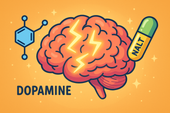
N-Acetyl L-Tyrosine (NALT) for Supporting Mental Clarity
N-Acetyl L-Tyrosine (NALT) fuels dopamine production — the neurotransmitter of focus and motivation. By supporting brain chemistry during stress, NALT helps restore mental clarity, energy, and alertness, making it easier to think clearly and feel present again ⚡🧠.
-

How Ginseng May Improve Focus and Energy in Dissociation
Ginseng helps combat the mental fatigue and fog that often come with dissociation. By supporting mitochondrial energy, balancing neurotransmitters, and regulating cortisol, it gently restores focus, motivation, and emotional presence — helping the mind reconnect with clarity and strength 🌿⚡.
-
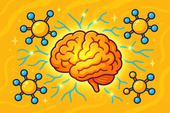
Phosphatidylserine and Dissociation: Supporting Cognitive Function
Phosphatidylserine helps calm the stress response by balancing cortisol, the body’s primary stress hormone. By lowering cortisol spikes, it protects memory, focus, and emotional stability — restoring clarity and mental presence for those struggling with dissociation 🧠🌿.
-
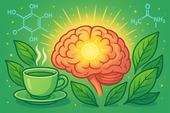
Can Green Tea Extract Help with Dissociative Brain Fog?
Green tea extract may help lift dissociative brain fog by supporting neurotransmitter balance, reducing inflammation, and enhancing energy at the cellular level. With its key compounds EGCG and L-theanine, it promotes calm focus, clarity, and emotional presence — helping you feel more alert and grounded 🍵🧠.
-
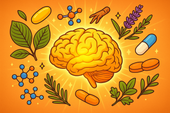
Building a Natural Supplement Stack for Dissociation Support
Building a supplement stack for dissociation means nourishing the brain and body back into communication. By supporting neurotransmitters, gut health, and energy balance through nutrients like magnesium, omega-3s, curcumin, and probiotics, you can help restore clarity, calm, and connection — one layer at a time 🌿🧠.
-

Chamomile and Lavender for Dissociative Anxiety Relief
Chamomile and lavender work together to calm dissociative anxiety by soothing the nervous system and restoring emotional safety. Their natural compounds balance cortisol, enhance GABA activity, and activate the vagus nerve — helping you feel grounded, connected, and at peace again 🌿💜.
-
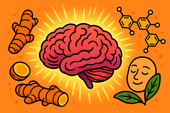
Curcumin for Inflammation and Mental Clarity in Dissociation
Curcumin, the golden compound in turmeric, does more than fight inflammation — it helps clear the mental fog often tied to dissociation. By calming neuroinflammation, balancing neurotransmitters, and supporting mitochondrial energy, curcumin can restore mental clarity, focus, and emotional presence 🌿🧠.
-
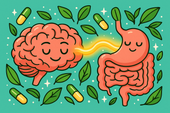
Probiotics and Dissociation: Exploring the Gut–Brain Axis
The gut–brain axis plays a vital role in emotional awareness and presence. When the microbiome is balanced, it supports serotonin production, vagus nerve activity, and calm focus. Probiotics help repair this connection — restoring safety, clarity, and the feeling of truly being in your body again 🌿🧠.
-
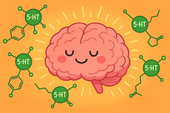
5-HTP for Dissociation: Supporting Serotonin and Emotional Stability
5-HTP helps bridge the gap between emotional numbness and stability by supporting serotonin production — the neurotransmitter that shapes mood, sleep, and sensory awareness. For people experiencing dissociation, 5-HTP may gently restore connection, presence, and emotional balance from the inside out 🌿🧠.

















































